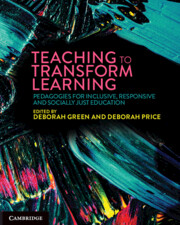Book contents
- Teaching to Transform Learning
- Acknowledgement of Country
- Teaching to Transform Learning
- Copyright page
- Contents
- Contributors
- Acknowledgements
- Introduction Understanding the learner to inform educators’ implementation of pedagogical approaches to transform learning
- Part 1 Pedagogies for all
- 1 Aboriginal pedagogies: exploring Indigenous ways of knowing, being and doing
- 2 Making lifeworld connections through critical pedagogies
- 3 Culturally responsive pedagogies: learners as assets
- 4 Traversing identities: navigating the self, school and system for culturally responsive pedagogies
- 5 Culturally and religiously responsive pedagogy: a case study of enabling pedagogy for superdiverse Australian classrooms
- 6 Enabling pedagogy and critical teaching approaches in diverse learning contexts
- 7 Pedagogy of hospitality
- Part 2 Engaging pedagogies: making the curriculum come alive for all learners
- Part 3 Empowering pedagogies: 21st-century skill development and 22nd-century futures thinking
- Index
- References
2 - Making lifeworld connections through critical pedagogies
from Part 1 - Pedagogies for all
Published online by Cambridge University Press: 25 October 2024
- Teaching to Transform Learning
- Acknowledgement of Country
- Teaching to Transform Learning
- Copyright page
- Contents
- Contributors
- Acknowledgements
- Introduction Understanding the learner to inform educators’ implementation of pedagogical approaches to transform learning
- Part 1 Pedagogies for all
- 1 Aboriginal pedagogies: exploring Indigenous ways of knowing, being and doing
- 2 Making lifeworld connections through critical pedagogies
- 3 Culturally responsive pedagogies: learners as assets
- 4 Traversing identities: navigating the self, school and system for culturally responsive pedagogies
- 5 Culturally and religiously responsive pedagogy: a case study of enabling pedagogy for superdiverse Australian classrooms
- 6 Enabling pedagogy and critical teaching approaches in diverse learning contexts
- 7 Pedagogy of hospitality
- Part 2 Engaging pedagogies: making the curriculum come alive for all learners
- Part 3 Empowering pedagogies: 21st-century skill development and 22nd-century futures thinking
- Index
- References
Summary
While there are many different interpretations of critical pedagogy (Wink, 2011), at its heart is a genuine connection with learner lives and lifeworlds. In an era of increased standardisation, and calls for ‘back to basics’ education, critical pedagogy engages both learners and educators in working together as powerful creators of knowledge. In the process, the constructed nature of knowledge is made explicit (Lankshear, 1997). Learners whose ‘virtual schoolbags’ (Thomson, 2002), which are the rich knowledge and experience gained through social and cultural lifeworlds, are typically not invited into the classroom and therefore risk a life of disengagement from formal schooling. It is these learners who are most clearly poised to benefit from a critical pedagogic approach.
Keywords
- Type
- Chapter
- Information
- Teaching to Transform LearningPedagogies for Inclusive, Responsive and Socially Just Education, pp. 30 - 41Publisher: Cambridge University PressPrint publication year: 2024

